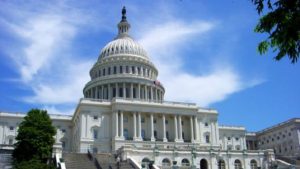
Bipartisan legislation has been put forward in both Senate and the House to ban the export of U.S. technology Beijing could use in surveillance of detained Muslims while holding Xinjiang CCP Secretary responsible for the dramatic situation of human rights in the “autonomous” region.
Marco Respinti
On Wednesday, November 14, a bipartisan bill was introduced in both houses of the U.S. Congress, urging a stronger response by the President Donald J. Trump’s administration to China’s crackdown on minority Muslims, including possible sanctions against Xinjiang region’s Communist Party Secretary Chen Quanguo, also a member of the powerful politburo, accused of being responsible for the dramatic situation in the region. The bill has been put forward by Sens. Marco Rubio (R-FL) and Bob Menendez (D-NJ) in the Senate and by Reps. Christopher H. Smith (R-NJ) and Thomas Suozzi (D-NY) in the House. Sen. Rubio and Rep. Smith are the chairman and co-chairman of the U.S. Congressional-Executive Commission on China respectively, an independent and bipartisan institution with the legislative mandate, which monitors human rights and the development of the rule of law in the People’s Republic of China.
The legislation they have introduced also asks President Trump to call for a new “special coordinator” of U.S. policy on the issue and seek consideration of a ban on export of U.S. technology Beijing could use in surveillance of detained ethnic Uyghurs.
The bill follows a bipartisan letter from 15 U.S. senators and representatives sent on August 29 to the Secretary of State Mike Pompeo and Treasury Secretary Steven Mnuchin, urging them to swiftly impose sanctions against those individuals and entities complicit in and directing human rights violations in Xinjiang.
In the “autonomous” region of Xinjiang, as many as a million and a half Muslims are detained in “transformation through education” camps. One million are ethnic Uyghurs being deprogrammed, and the rest ‒ Kazakhs and other China’s Muslim minorities as well as ethnic Hui.
Sen. Rubio and Rep. Smith have begun unveiling the truth about the persecuted Muslims in Xinjiang during the Ministerial to Advance Religious Freedom, organized in Washington, D.C., by the U.S. Department of State led by Secretary Pompeo along with Samuel D. Brownback, U.S. Ambassador-at-large for International Religious Freedom. During the meeting, held on July 24-26, 2018, representatives of 82 countries discussed the status of religious freedom in the world. Since then, the attention of the US legislators and the Department of State to religious freedom in China has gained momentum.
Sen. Rubio and Rep. Smith, who are very keen on China, are undoubtedly using the international attention brought about by the new commercial war caused by President Trump’s policy on tariffs to raise the issue of human rights and religious freedom ‒ the very question that not too many are willing to ask in dealing with China. Sen. Rubio and Rep. Smith, two unashamed Catholics, have, in fact, a record of defending human rights against violations, and Rep. Smith, a well-known pro-lifer, has always been very active in denouncing the gruesome “one-child policy” imposed for years on Chinese couples by the neo-post-communist regime in Beijing. Now, in Secretary Pompeo (a devout evangelical Presbyterian) and Ambassador Brownback (another staunch Catholic), they have important allies. If, in fact, the first year of the Trump administration seemed not much interested in international religious freedom, while the George W. Bush administration was, and Barack Obama’s wasn’t (at least as genuine religious freedom is usually intended), with the arrival of Pompeo at the head of the American diplomacy after Rex Tillerson and the nomination of Brownback, the situation has changed.
And this new attitude also marks another significant political shift for America. After 9/11, the United States brought the cheap and politically rewarding rhetoric of describing all Muslims as terrorists, or somewhat tied to terrorism. Xinjiang’s Uyghurs made, sadly, no exception, to the great satisfaction of the CCP. But confronting reality, this attitude has slowly changed; and today, thanks also to significant efforts by the Congressional-Executive Commission on China, the U.S. have learned to distinguish between friends and foes also among Chinese Muslims.
The rationale behind the bill introduced in the U.S. Congress on Wednesday was the Global Magnitsky Act, i.e., formally, the Russia and Moldova Jackson-Vanik Repeal and Sergei Magnitsky Rule of Law Accountability Act of 2012. The bipartisan bill, passed by the U.S. Congress and signed into law by President Barack Obama in December 2012, was designed to punish Russian officials responsible for the death of Russian tax accountant Sergei Magnitisky (1972-2009) in Moscow’s Matrosskaya Tishina Prison who worked for the American law firm Firestone Duncan in Russia. In fact, the bill allows the U.S. Government to sanction foreign government officials implicated in human rights abuses anywhere in the world.
Source: Bitter Winter / Marco Respinti



